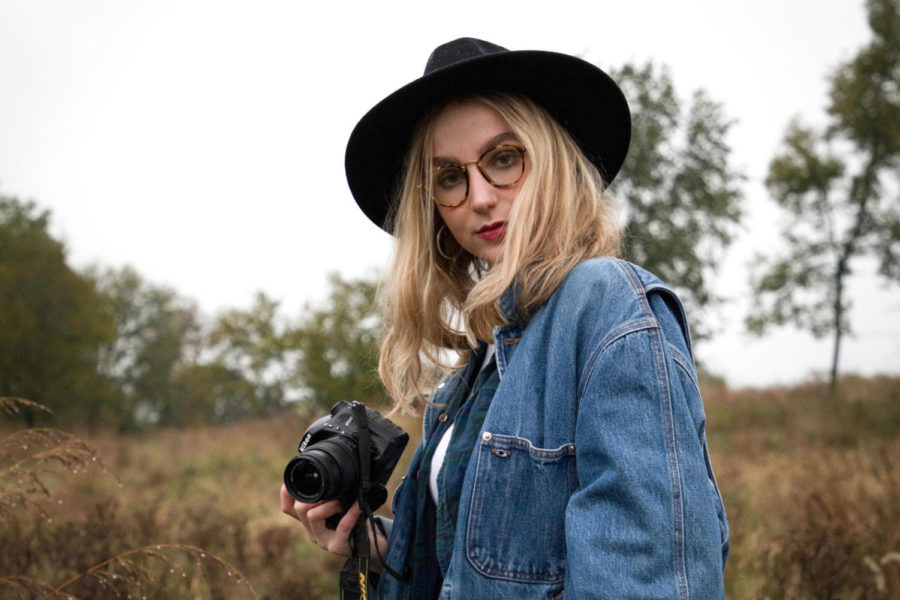Junior Caroline Judd gets a head start on arts focused career
February 13, 2019
Looking into the camera, junior Caroline Judd stands with some of the equipment she uses in her photoshoots. Judd prefers to shoot outside in natural lighting rather than indoors with flash photography. “Natural lighting fits well with the photography that I envision,” Judd said. “Natural lighting makes editing my photos much easier because it allows me to play with the colors.”
What kind of art do you create?
“I am very passionate about photography and videography. I started out doing classic art like drawing and painting, but I discovered my love for photography when I got my first camera. After that, my skills developed and now I have my own business.”
How much time do you spend with photography outside of school?
“My work is mostly separate from school. I have several photoshoots per week and they all take hours outside of school, and none of them have anything to do with school. It’s something that I have to take my own time to do.”
Does your school sufficiently provide for artistic students?
“I’ve had teachers like [Debra] Klevens and [Katy] Mangrich who have helped me, but I would say that 99 percent of what I do to progress my career is done outside of school. I think that students who don’t have the resources that I do would not be able to reach their potential with what the school gives us. I’ve invested lots of money into camera equipment and editing software that you can’t get at school. I understand that that isn’t a priority for the school, but it’s hard when you want to follow a career that isn’t typical, or STEM-focused, because you have to put so much time in outside of school while also balancing your schoolwork.”
As an artist, do you ever feel underestimated by the STEM-focused world?
“I sometimes feel underestimated by adults. I feel like people underestimate me when I tell them I do photography. I’ve shown some of my teachers my work and they have said that they underestimated me. That just shows what people think of you as an art student.”
How do you respond to people who tell you to find a backup plan?
“I’m going to do what I love with my life, and whether that’s photography, or something different, I know what it’s not. I think that people are born with certain passions and there’s only so much that they can do to change their passion. I won’t need a backup plan because I’m so passionate about what I do. I know my career as a photographer will work because I work so hard and already have my own business.”
How does it feel to be an artist attending a seemingly STEM-focused school?
“I think it’s important to have a balance of every field in school, but I also think that there should be more opportunities for kids who know exactly what they want to do in the future. There are a handful of kids who are sure of their career, and I think that they should be able to work on that in school. If I’m going to be a professional photographer, why do I need to know how to solve a polynomial function? It just doesn’t make sense and it’s frustrating for me to sit at school when I could be away from school, challenging myself in things that actually correlate with my life.”
Given the chance to confront STEM-focused educators, what would you say?
“Artists need to be taken more seriously. Just because we’re not in a STEM field doesn’t mean that we can’t make an impact. We’re not like everybody else, but that doesn’t mean that we deserve fewer class options, less funding and less credibility. Being a creative person surrounded by students who are worked like machines frustrates me greatly and I wish there were a way for students’ personal passions to be encouraged at school. It’s not that I don’t feel like I belong, it’s that if I had a schedule that allowed me to be more creative, I could work harder for my future while improving my mental health. While I do work hard in school and earn good grades, my high school transcript says nothing about me.”
How do you manage your time between school and photography?
“I struggle with stress and anxiety because of my busy schedule, but I know that it’s something that I have to deal with because my high school doesn’t offer me the resources that I need to pursue my career while also functioning as a full-time student. I have to keep my end goal in mind because it helps me realize that high school is just something that I have to get through in order to be where I want to be. After these four years, there will come a time that I’ll be able to truly thrive in the career that I have built.”
What would you say to other young, aspiring artists?
“Don’t let a system tell you your worth. You will be underestimated by your teachers and your school, so be sure of yourself, know yourself and let that drive you. You’re worth more than your transcript.”

